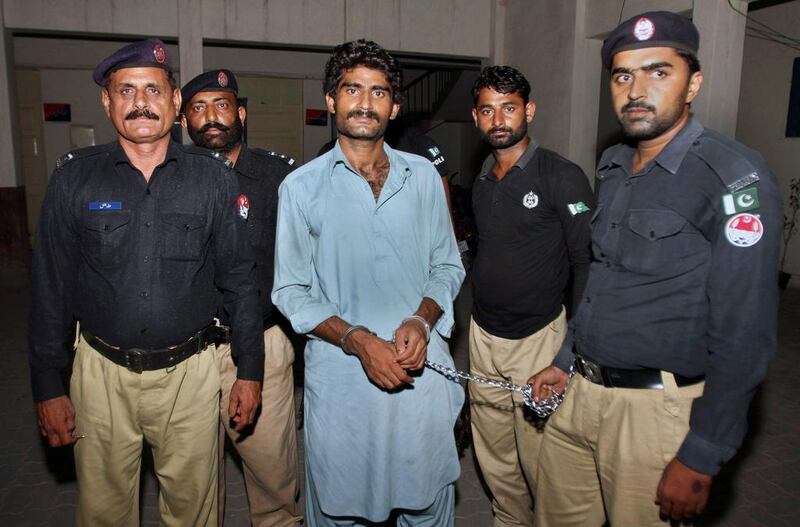Multan, Pakistan // The brother of a murdered Pakistani celebrity said on Sunday he is “not embarrassed” to have killed her because she posted “shameful” pictures on Facebook.
The strangling death of Qandeel Baloch reignited polarising calls for action against the epidemic of “honour killings” in Pakistan.
Police arrested her brother, Waseem Azeem, and presented him before the media in Multan, where he confessed to drugging then strangling her. He said people had taunted him over the photos and that he found the social embarrassment unbearable.
“I was determined either to kill myself or kill her,” Azeem said as he was being led away.
Baloch, believed to be in her twenties and whose real name was Fauzia Azeem, rose to fame for her provocative Facebook posts that saw her praised by some for breaking social taboos but condemned by conservatives.
She was killed on Friday night at her family’s home near Multan. Wasim went on the run and was arrested late Saturday in neighbouring Muzaffargarh district.
“Yes of course, I strangled her,” Wasim said defiantly at a press conference, organised by police, on Sunday.
“She was on the ground floor while our parents were asleep on the roof top,” he continued. “It was around 10.45pm when I gave her a tablet ... and then killed her.”
Wasim said he acted alone.
“I am not embarrassed at all over what I did,” he said.
“Whatever was the case, it [his sister’s behaviour] was completely intolerable.”
Baloch’s death has prompted a wave of shock and revulsion in a country where hundreds of women are murdered for “honour” every year.
The killers overwhelmingly walk free because of a law that allows the family of the victim to forgive the murderer — who is often also a relative.
Filmmaker Sharmeemn Obaid-Chinoy, whose documentary on such killings won an Oscar earlier this year, slammed Baloch’s murder as symptomatic of an “epidemic” of violence against women in Pakistan.
She joined other liberals in Pakistan who called for anti-honour killing legislation. “Activists have screamed themselves hoarse,” she said. “When will it stop?”
But many conservatives pushed back, with some arguing online that her family would have had “no choice”.
Some of Baloch’s more notorious acts included volunteering to perform a striptease for the Pakistani cricket team, and donning a plunging scarlet dress on Valentine’s Day.
She also posed for selfies with a high-profile mullah in an incident that saw him swiftly rebuked by the country’s religious affairs ministry.
She told local media she had received death threats after the controversy, and that her requests for protection from authorities had been ignored.
Baloch’s funeral was held early Sunday near her family home in southern Punjab.
* Agence France-Presse and Associated Press





